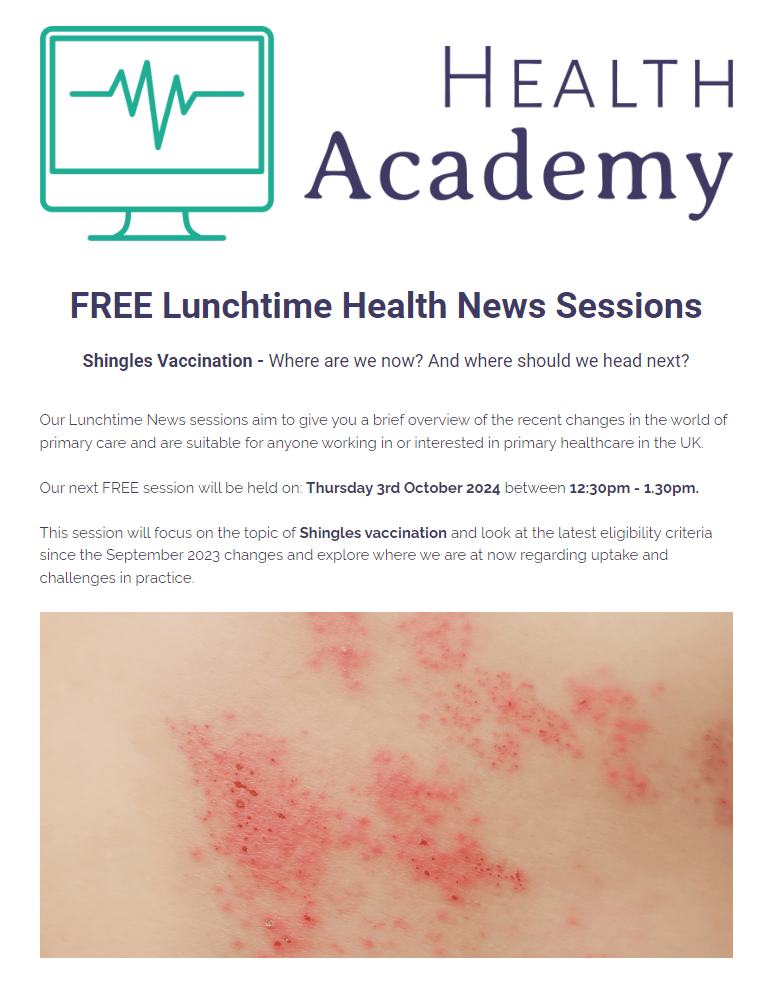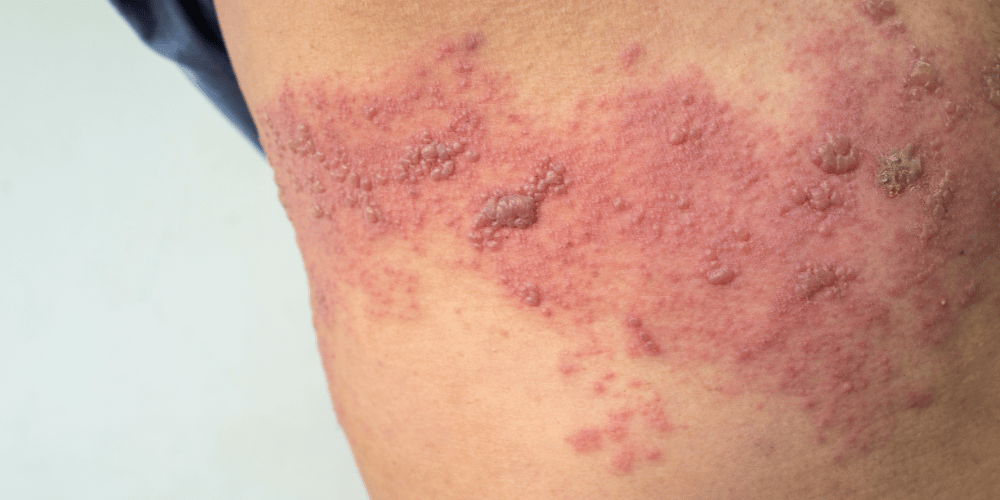Shingles, a painful and often debilitating condition, remains a significant public health concern, particularly among older adults and those with weakened immune systems. While the UK vaccination programme has dramatically reduced the incidence of shingles and its complications, there is still much work to be done to protect vulnerable populations.
We have now reached the end of the first year where the eligibility has been expanded in the programme. So, it seems apt to look back and see where we are at. The latest annual shingles vaccine uptake data (September 2023- April 2024, as published on August 2024) is quite disappointing. Although uptake has generally risen from last year, we are still not collectively reaching everyone that needs to be reached. For instance, in those eligible turning 70, only 34.5% of this group had received a shingles vaccine by half way through the year. But, this was slightly better than the 27.7% a the same time point the year before. The immunosuppressed groups are of particular concern: 15% of those who are eligible received a vaccine by the half way point.
The goal was to vaccinate ALL those in the over 50’s immunosuppressed groups by September 2025. We will get to see that final data in October 2024, but it’s not looking great so far.
There’s still much work to be done.
As health professionals, we play a crucial role in the effort to reduce Shingles suffering. Understanding the landscape of shingles vaccination and strategies to improve vaccine uptake is essential in reducing the burden of this disease.
Shingles and its Risks
Shingles, caused by the reactivation of the varicella-zoster virus, presents a unique challenge due to its unpredictable nature and potential for severe complications. While anyone who has had chickenpox is at risk, the likelihood of developing shingles increases significantly with age and immunosuppression.
For some patients, this can mean intense pain, prolonged discomfort, and in some cases, long-term nerve damage known as postherpetic neuralgia (PHN). And ultimately this all culminates in isolation -and what can probably be described as ‘utter misery’. The long-term consequences have left some people in so much pain that they have committed suicide. Adults over 50, individuals with chronic conditions like HIV or cancer, and those undergoing treatments that weaken the immune system are particularly susceptible to the severe long term consequences of Shingles, as well as the risk of the disease itself.
Shingles Prevalence in High-Risk Groups

Despite the availability of effective vaccines, shingles continues to affect a substantial portion of the population, with millions of cases reported annually. Older adults and immunocompromised individuals are not only more likely to develop shingles but also more likely to experience severe, prolonged symptoms.
The overall annual incidence in the UK is estimated to be 1.85–3.9 cases per 1000 population, increasing with age from less than 2 cases per 1000 in people under 50 years old, to 11 cases per 1000 in people aged 80 years or older. In people aged 70–79 years, the annual incidence in England and Wales is around 790–880 cases per 100,000 people. The overall incidence rate of shingles in the immunocompromised cohort is around 7.8 cases per 1000 and this also increases in risk with rising age.
As our population gets older, the number of individuals at high risk for shingles will naturally be increasing. With advances in modern medicine, more people than ever will be living longer with immunosupressive conditions too (they may not have been around as long in previous years).This makes it more urgent than ever to ensure that those who are most vulnerable are adequately protected through vaccination. It is clear that there is room for improvement in how we are achieving this.
The Role of Vaccination in Prevention

Vaccination remains the most effective tool we have in the fight against shingles. As of September 2023 Shingrix is now the preferred vaccine, replacing the older Zostavax. These vaccines have been a game-changer, with Shingrix offering over 90% efficacy in preventing both shingles and PHN, particularly in older adults.
The UKHSA currently recommends Shingrix for all adults who have turned 65 after the 1st September 2023, all those currently aged 70-79 and those aged over 50 in certain categories of immunosuppression with no upper age limit. However, it is clear that vaccination rates remain suboptimal, particularly among those most at risk.
Addressing Barriers to Vaccination

The UK was the first European country to introduce a national immunisation programme for shingles (in 2013–2014). That year, vaccination coverage ranged from 50 to 64% in the 70-79 year old cohort across the UK, but shingles vaccine uptake seems to have declined ever since.
One of the key challenges we face is overcoming the barriers that prevent higher vaccination rates. Lack of awareness among patients, misconceptions about vaccine safety, and issues related to access or identifying eligibility are all significant obstacles. It is particularly worrying that a high proportion of eligible people haven’t heard of Shingles at all, let alone know that they are eligible for the vaccine. In a Shingles Vaccine Update Special in May 2022 they reported that 69% of older adults eligible for routine shingles vaccines in the most deprived areas didn’t know they were eligible for the vaccination against shingles. furthermore, 55% hadn’t heard of the disease at all.
In a 2019 study (involving surveying 69 general practices) on the determinants of vaccine acceptance, they reported that less than half (44.0%) of the GPs were aware of the local communication campaigns regarding shingles and the shingles vaccine. As health professionals, our role in educating patients and advocating for vaccination is vital. By addressing concerns, providing clear information, and making vaccines more accessible, we can significantly increase uptake and protect more individuals from the severe consequences of shingles.
Future Directions in Shingles Vaccination and Treatment

The government has been putting out adverts on TV and social media. Research continues on how best to present information to the general public when it comes to vaccine campaigns. It is important that Health Professionals are aware of the national effort and can translate this into local interventions too.
Research into shingles prevention and treatment continues to evolve, with promising developments on the horizon. Future advancements may include more tailored vaccination strategies, such as booster doses for immunocompromised patients or new vaccines with even greater efficacy.
Additionally, ongoing studies are exploring better ways to manage PHN and other complications of shingles, which could further enhance the overall care we provide to our patients. Staying informed about these advancements will be crucial in continuing to improve patient outcomes.
We can make a significant impact in reducing the burden of shingles, particularly among those who need protection the most. Try not to miss any opportunity to enhance your knowledge and contribute to better health outcomes for our patients. So, for starters why not attend our free lunchtime webinar and get some practical tips for increasing vaccine uptake in your practice?

Register now for our webinar ‘Shingles Vaccination – Where are we now? And where should we head next?’ on 3rd October 2024 at 12:30pm.
The session aims to cover:
- Who is eligible for shingles vaccination these days?
- What do these changes mean in practice?
- What are the challenges faced in practice?
- Tips for facing these challenges and improving vaccination uptake
- Useful resources
The fight against shingles is far from over. But with effective vaccination and proactive patient care, we can make a substantial difference. As health professionals, our role is pivotal in this effort. Together, we can ensure that more people are protected from the painful and life-altering consequences of shingles.
And one final thought for us all: The lifetime risk of developing shingles is 20–30%. Are YOU (or anyone you know personally) due a vaccine?




